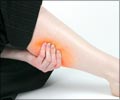Nighttime leg cramps commonly affect adults over the 50 years of age, but are also known to occur in younger adults and children, and their cause is unknown.

It was seen that prescriptions for quinine peaked in B.C. in July, as did Google searches in the United States. Google Trends data also indicated a similar peak for the search term in Australia in the month of January, which is near mid-summer in the southern hemisphere.
The study’s principal investigator Scott Garrison said, “Most doctors will be surprised to learn that this condition is seasonal. For us the greatest surprise came in just how strong that relationship was. From our data, it looks like the burden of cramp symptoms may roughly double in the peak of summer, compared with the mid-winter low. While quinine works for some people, it comes with significant risk of toxicity. Rather than taking quinine every day to prevent cramps during the night, it may be possible for patients to stop taking their quinine in the six colder months of the year when their cramps may not be as bad. Understanding why your symptoms are getting worse also helps you to cope with them.”
The findings are published in the Canadian Medical Association Journal.
Source-Medindia














